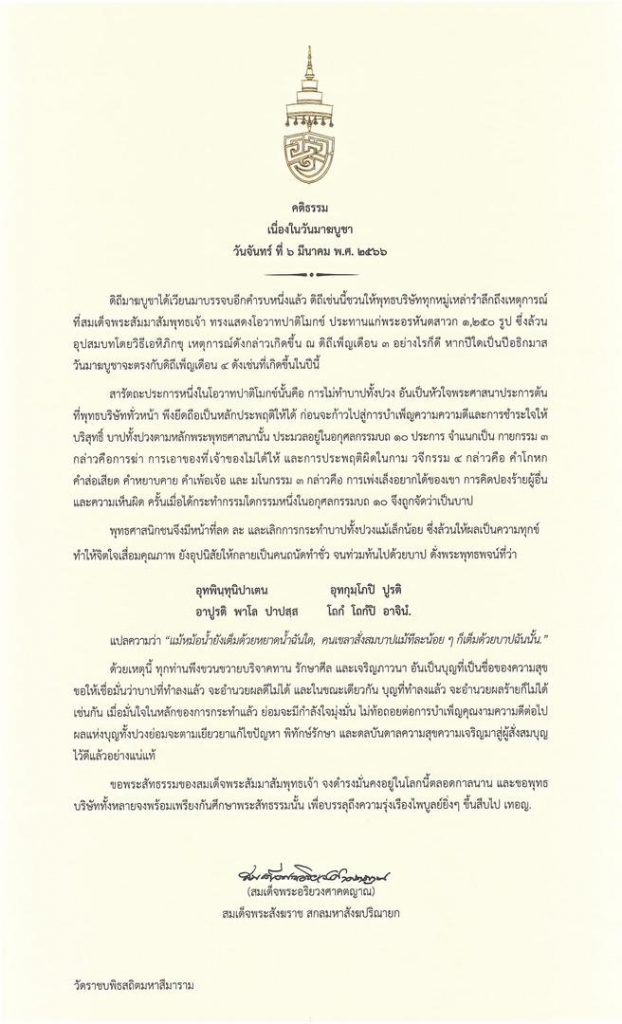
A Dhamma Message for Māgha Pūjā
Monday, March 6, 2566 B.E.
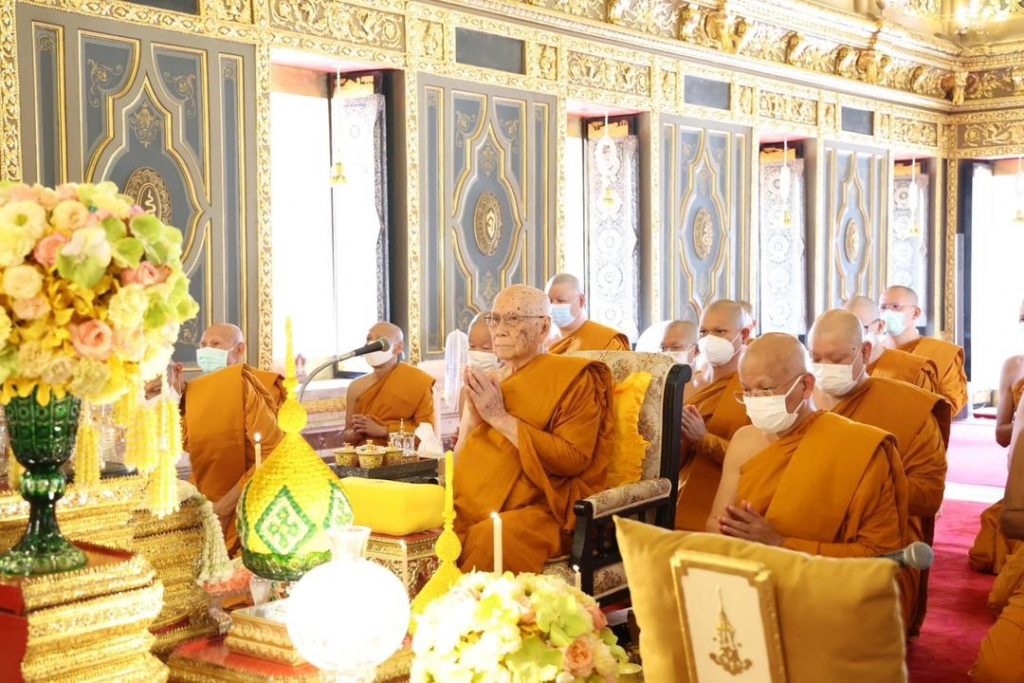
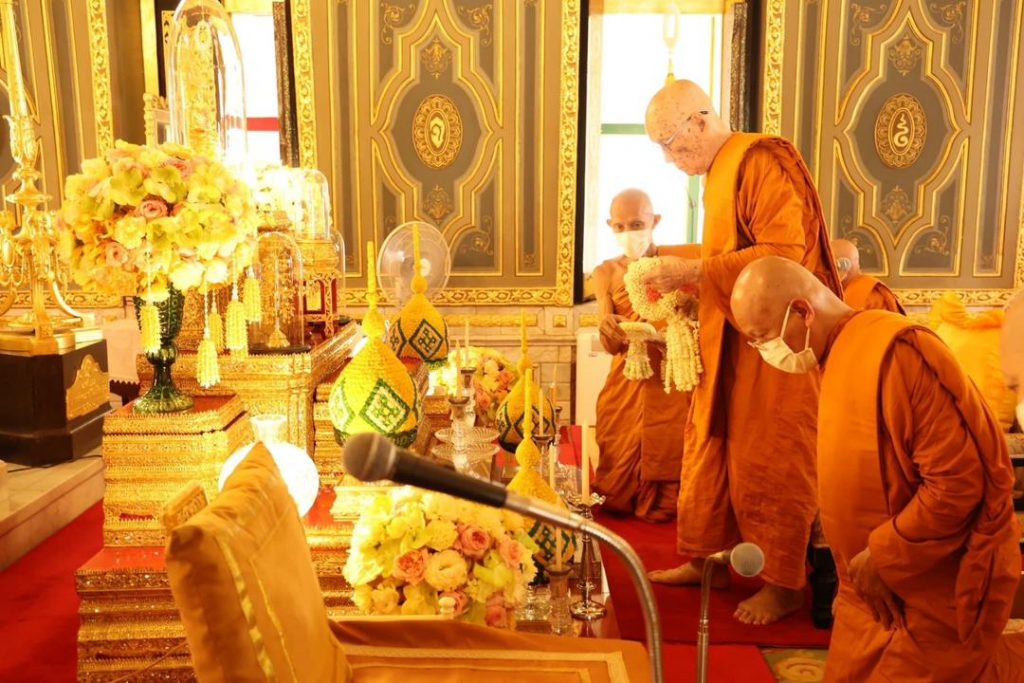
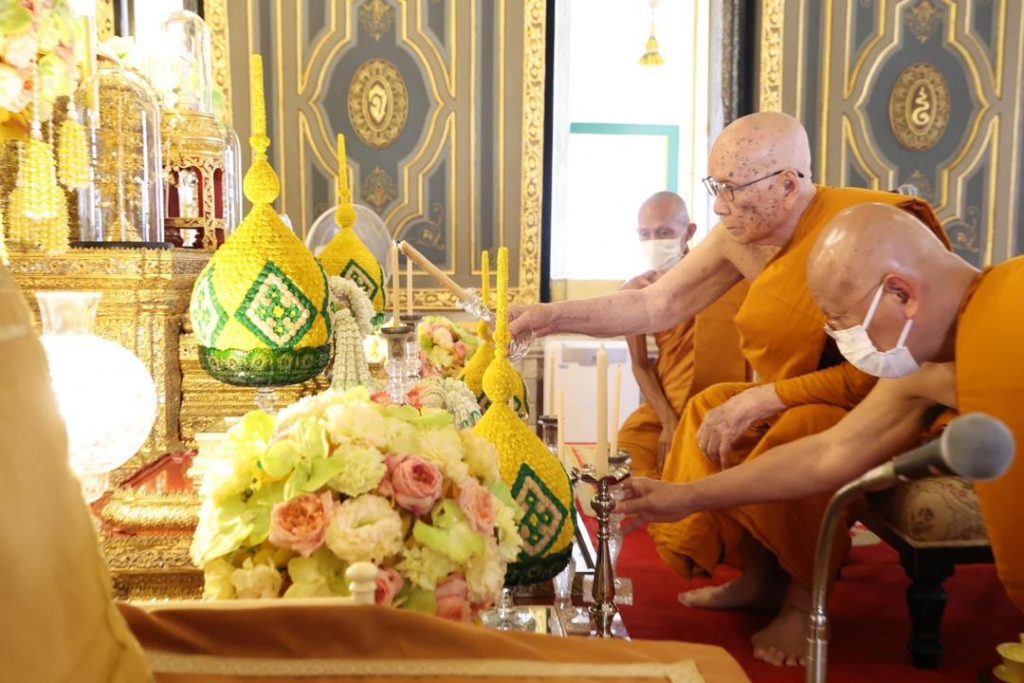
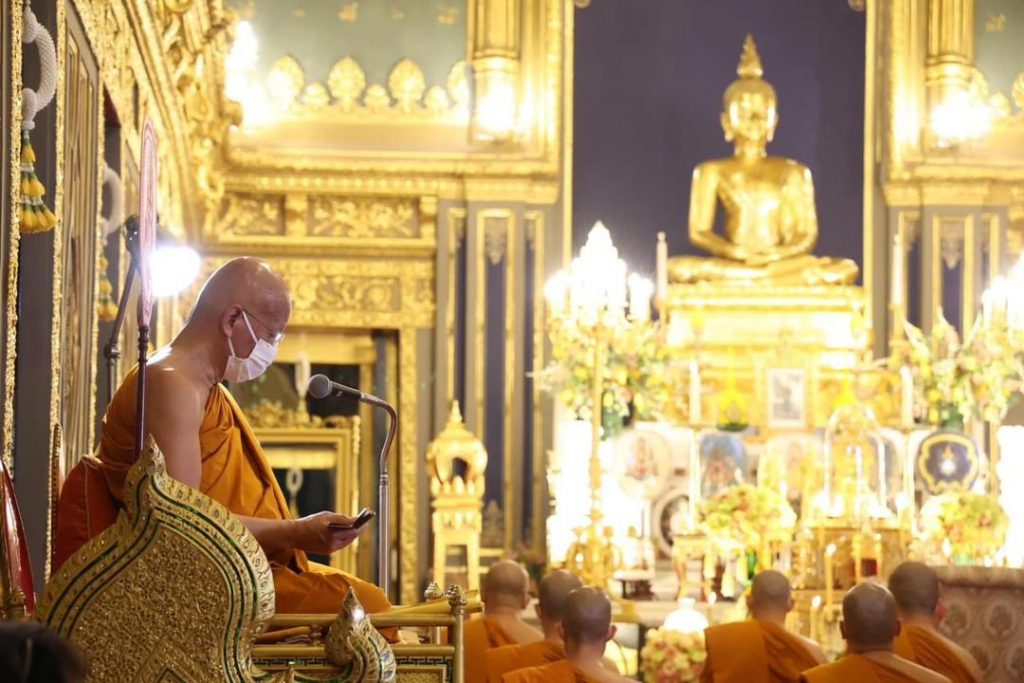

The date of Māgha Pūjā has come around once more. This date invites all groups in the Buddha’s following to remember the event when the Buddha gave the Ovāda Pātimokkha to 1,250 of his arahant disciples, all of whom had received the “Come, bhikkhu” ordination directly from the Buddha himself. This event happened on the full moon of the third lunar month, although on years when there is an extra lunar month, Māgha Pūjā is observed on the full moon of the fourth lunar month, as is happening this year.
One of the messages of the Ovāda Pātimokkha is “the non-doing of any evil,” which is the first step of the heart of the Buddha’s teachings that all Buddhists must hold to as a firm principle in their behavior before progressing on to the higher steps of developing goodness and purifying the heart. “All evil,” in the Buddha’s teachings is covered in the tens types of unskillful behavior, which fall under three headings:
the three types of bodily misbehavior—killing, stealing, and illicit sex;
the four types of verbal misbehavior—lying, divisive speech, harsh speech, and idle chatter; and
the three types of mental misbehavior—inordinate greed, ill will, and holding to wrong views.
To do any of the actions listed in these ten types of unskillful behavior counts as doing evil.
All Buddhists thus should regard it as their duty to abandon even the slightest forms of evil, because all of these things result in suffering and lower the quality of the heart and mind. To engage in any of these forms of behavior makes one the sort of person who finds it habitually easy to misbehave, to the point where one is overflowing with evil, as in the Buddha’s saying:
uda-bindu-nipātena uda-kumbho-pi pūrati
āpūrati bālo pāpassa thokaṁ thokam-pi ācinaṁ.
Which means:
A water jar fills,
even with water falling in drops.
With evil—even if bit by bit,
habitually—
the fool fills himself full.
For this reason, each of you should make a diligent effort in being generous, following the precepts, and meditating, all of which are the activities of goodness that the Buddha said are forms of happiness. I ask that you believe firmly that whatever evil you have done in the past cannot give good results and, at the same time, that the goodness you have done cannot give bad results. When you are firmly confident in the principles of action, you will have the solid inner strength needed to keep on doing good unflaggingly into the future. The fruits of that goodness will follow you, solving and alleviating your problems, protecting you, and engendering happiness and prosperity for you as a person who has accumulated goodness. This is for sure.
May the Buddha’s True Dhamma remain in this world for all time. And may all Buddhists work together to train in that True Dhamma to attain ever-increasing levels of brilliance and abundance on into the future.
Somdet Ariyavaṁsākatañāṇa
His Holiness, the Supreme Patriarch
值此 2023 年 3 月 6 日 “Māgha Pūjā”之際,
泰國僧王 Somdej Phra Ariyavaṃsagatañāna尊者,賦予以下佛法開示:
“今日時逢Māgha Pūjā,在這樣的日子裡,讓佛弟子們憶念起在這一天佛陀宣說“教誡波提木叉Ovāda
Paṭimokka”, 賜予1250位阿羅漢弟子,他們都是依“善來比丘”之法而出家的比丘。 這事件發生在古印度三月的滿月日。但是,如果任何一年是閏年,Māgha
pūjā是古印度四月的滿月日,就像今年發生的那樣。
“教誡波提木叉Ovāda Paṭimokka” 的精華之一是“諸惡莫作”——不犯一切的過錯。 這是佛法中的核心教法,是每一位佛弟子在深入到“眾善奉行”與“淨化內心”之前,必須要能做得到的行為準則。所謂的“諸惡”,包含了“十不善業”,分為
1)身體的三種惡行:殺生、偷盜、邪淫;
2)言語的四種惡行:欺騙、兩舌、惡口、綺語;
3)意念的三種惡行:貪欲、瞋恚、邪見。
只要犯了以上任何一種,那就是歸類為“過錯”。
因此,佛教徒有責任減少、放棄和避免犯下哪怕是少量的罪惡與過錯。因為這一切的過錯與罪惡,都會導致痛苦和內心素質的墮落,變成容易造惡犯錯的性格,最後導致被罪惡所淹沒,如佛所說:
uda-bindu-nipātena uda-kumbho-pi pūrati
āpūrati bālo pāpassa thokaṁ thokam-pi ācinaṁ.
意思是:
“即使以一滴一滴的水滴,
也能盈滿水壺,
即使以一點一點累積惡,
愚人也會惡貫滿盈”。
為此,大家要認真布施、持戒以及禪修。 這都是功德,是幸福快樂的名字。請相信:犯下的過錯罪惡,不會帶來好的結果;與此同時,所做的功德也不會產生不好的結果。 當對因果業報的法則具有信心,就會有力量與決心,不放棄繼續行善。這一切善法功德的果報,必然為善積功德的人,解決問題、保護和帶來幸福與安樂。
祈願佛陀的正法久住世間,願所有的佛弟子,能共同學習佛陀的正法,以讓佛法更加的昌盛。

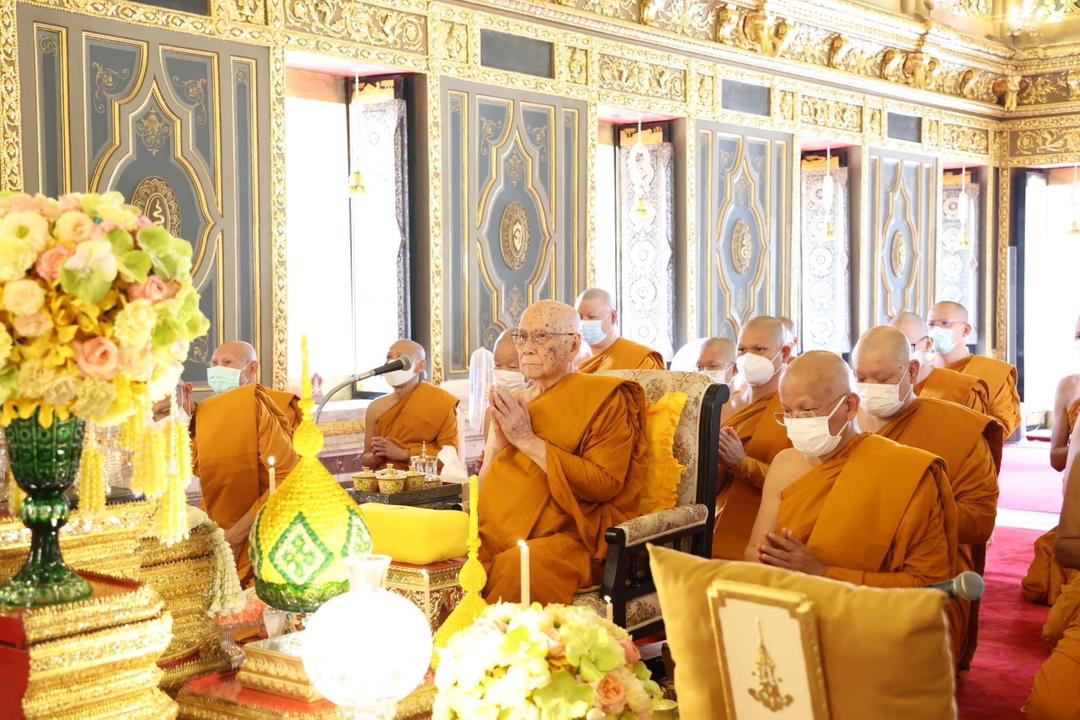
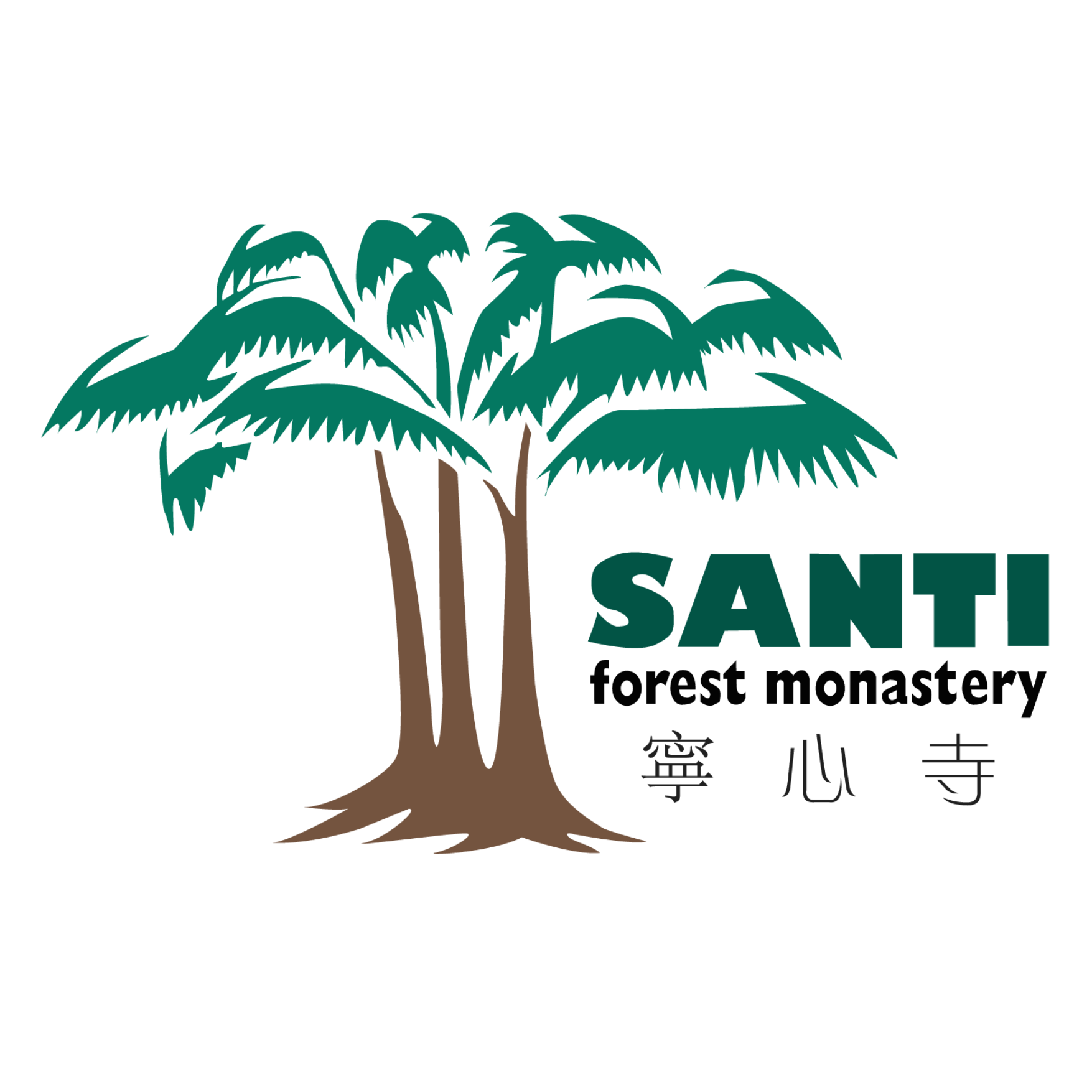
Comments are closed